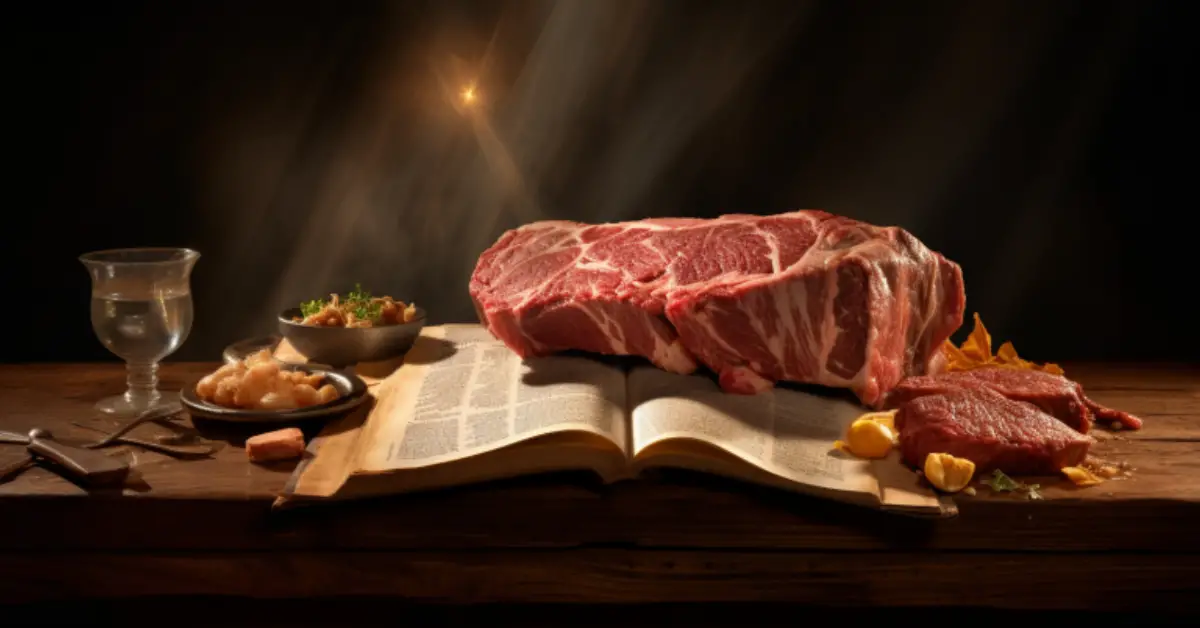Meat in the Bible is quite a fascinating subject! It’s clear that eating meat isn’t prohibited. In Genesis, animals are given to humans for food after the flood, and Jesus partakes in eating fish and lamb. However, the New Testament does guide Christians to be considerate of others’ beliefs about eating meat.
There’s a discussion about food offered to idols. Some believers think it’s a sin to eat such meat, but Paul, in his letters, explains it’s about the believer’s conscience and consideration for others’ beliefs.
If you’re a person who finds peace in eating vegetables only, that’s cool! Paul says that too.
Curious to know more about meat and what other intriguing insights the Bible has? It talks about respect, conscience, and consideration in eating meat, and there’s more to explore. Read on for a flavorful journey through the Biblical view on meat!
What Does the Bible Say About Eating Meat?
The Bible offers rich, multi-layered insights into eating meat. In the Old Testament, Genesis tells us that after the flood, God allows Noah and his descendants to consume animal flesh, establishing a profound connection between humans and animals.
However, God does set boundaries, like not consuming blood, which is the life of the animal. This is outlined in Genesis 9:4. The Israelites were also given specific dietary laws in Leviticus, including a list of clean and unclean animals, reflecting a divine design for human consumption.
Jesus, central to the New Testament, ate fish and lamb. He partook in the Passover meal, which included lamb, symbolizing that eating meat was not inherently sinful. Moreover, Jesus multiplied fish to feed thousands, demonstrating God’s providence through animals.
Delving deeper, we see the Apostle Paul addressing meat consumption in his letters, focusing on meat sacrificed to idols. In places like Corinth, people would sacrifice animals to gods and then sell the meat in the market. Paul clarifies that since idols are not real gods, eating such meat is not inherently sinful. However, he emphasizes consideration and respect for others’ beliefs, explaining that if eating meat causes a brother to stumble, it is better to abstain.
This highlights a crucial aspect of the Christian life: freedom balanced with love and consideration for others. Paul beautifully articulates this balance in Romans 14, encouraging those who eat all things and those who eat only vegetables to not despise or judge each other, emphasizing peace and mutual edification.
Paul’s words resonate, implying that the act of eating meat is not a sin, but the conscience and consideration involved in the act are crucial. It’s not about the legality of eating meat; it’s about the love and respect we show to our fellow believers.
This alignment with the conscience and consideration reflects the essence of the Christian journey. The Bible, in its entirety, encourages us to look beyond the act of eating meat and to consider the implications our choices have on our relationship with God and others.
Bible Verses About Eating Meat
- Genesis 9:3-4 “Every moving thing that lives shall be food for you. And as I gave you the green plants, I give you everything. But you shall not eat flesh with its life, that is, its blood.” This verse demonstrates God’s allowance for eating meat but sets the boundary of not consuming blood, highlighting respect for life.
- Leviticus 11:2-3 “Speak to the people of Israel, saying, These are the living things that you may eat among all the animals that are on the earth. Whatever parts the hoof and is cloven-footed and chews the cud, among the animals, you may eat.” Here, God provides specific guidelines about which animals are clean and can be consumed, displaying God’s design for human dietary habits.
- 1 Corinthians 8:9 “But take care that this right of yours does not somehow become a stumbling block to the weak.” Paul’s counsel stresses the importance of being considerate and not causing others to stumble by our actions, including eating meat.
- Romans 14:21 “It is good not to eat meat or drink wine or do anything that causes your brother to stumble.” In this verse, the Apostle Paul is encouraging believers to be mindful of their actions and the impact they can have on others’ faith.
- 1 Timothy 4:4 “For everything created by God is good, and nothing is to be rejected if it is received with thanksgiving.” Paul’s words to Timothy underscore that eating meat is not inherently sinful and that all God’s creations are good when received with a thankful heart.
The discourse in the Bible about eating meat is rich and expansive, intertwining God’s laws, Jesus’ actions, and Paul’s advice on consideration and conscience, all culminating in a harmonious view that goes beyond mere consumption.


